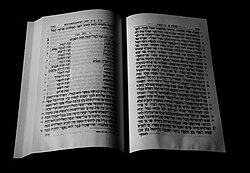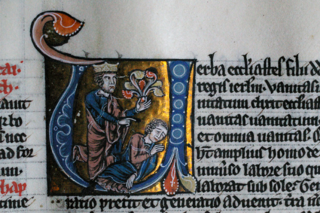
Ecclesiastes 1 is the first chapter of the Book of Ecclesiastes in the Hebrew Bible or the Old Testament of the Christian Bible. The book contains philosophical speeches by a character called Qoheleth composed probably between the 5th and 2nd centuries BC. Peshitta, Targum, and Talmud, as well as most Jewish and Christian readership, attribute the authorship of the book to King Solomon. This chapter contains the title of the book, the exposition of some fundamental observations and the problem of life, especially the failure of wisdom.
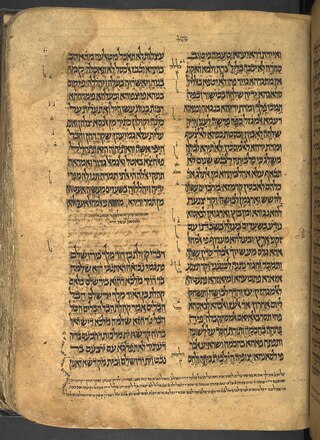
Ecclesiastes 2 is the second chapter of the Book of Ecclesiastes in the Hebrew Bible or the Old Testament of the Christian Bible. The book contains philosophical speeches by a character called Qoheleth, composed probably between the 5th and 2nd centuries BCE. Peshitta, Targum, and Talmud attribute the authorship of the book to King Solomon.

Ecclesiastes 4 is the fourth chapter of the Book of Ecclesiastes in the Hebrew Bible or the Old Testament of the Christian Bible. The book contains philosophical speeches by a character called '(the) Qoheleth', composed probably between the fifth and second centuries BCE. Peshitta, Targum, and Talmud attribute the authorship of the book to King Solomon. This chapter discusses life's hardship and life's companions.

Ecclesiastes 5 is the fifth chapter of the Book of Ecclesiastes in the Hebrew Bible or the Old Testament of the Christian Bible. The book contains philosophical speeches by a character called '(the) Qoheleth', composed probably between the fifth and second centuries BCE. Peshitta, Targum, and Talmud attribute the authorship of the book to King Solomon. This chapter contains advice on how to approach God the right way, and a discussion about poverty and wealth.

Ecclesiastes 6 is the sixth chapter of the Book of Ecclesiastes in the Hebrew Bible or the Old Testament of the Christian Bible. The book contains philosophical speeches by a character called '(the) Qoheleth', composed probably between the 5th and 2nd centuries BC. Peshitta, Targum, and Talmud attribute the authorship of the book to King Solomon. This chapter deals with wealth and insatiability.

Ecclesiastes 7 is the seventh chapter of the Book of Ecclesiastes in the Hebrew Bible or the Old Testament of the Christian Bible. The book contains philosophical speeches by a character called '(the) Qoheleth', composed probably between the 5th and 2nd centuries BC. Peshitta, Targum, and Talmud attribute the authorship of the book to King Solomon.

Ecclesiastes 8 is the eighth chapter of the Book of Ecclesiastes in the Hebrew Bible or the Old Testament of the Christian Bible. The book contains philosophical speeches by a character called '(the) Qoheleth', composed probably between the 5th and 2nd centuries BCE. Peshitta, Targum, and Talmud attribute the authorship of the book to King Solomon. This chapter concerns human and divine authority with the advice that fearing God is the wisest course.
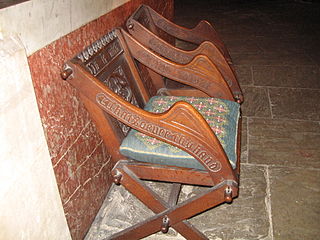
Ecclesiastes 9 is the ninth chapter of the Book of Ecclesiastes in the Hebrew Bible or the Old Testament of the Christian Bible. The book contains the philosophical and theological reflections of a character known as Qoheleth, a title literally meaning "the assembler" but traditionally translated as "the Teacher" or "The Preacher". The identity of Qoheleth it unknown. In traditional Jewish texts such as the Peshitta, Targum, and Talmud, authorship of Ecclesiastes is attributed to King Solomon, due to the statement in Ecclesiastes 1:1 which identifies Qoheleth as the "son of David, king in Jerusalem". However, it is generally agreed upon by contemporary scholars that the book could not have been written in the 10th century during the time of Solomon. It is now thought to be one of the latest books in the Old Testament to be written, likely sometime between the 5th and 3rd centuries BCE.

Ecclesiastes 10 is the tenth chapter of the Book of Ecclesiastes in the Hebrew Bible or the Old Testament of the Christian Bible. The book contains philosophical speeches by a character called '(the) Qoheleth', composed probably between the 5th and 2nd centuries BCE. Peshitta, Targum, and Talmud attribute the authorship of the book to King Solomon. This chapter focuses on foolishness in persons, in high places, in action, in words and even in national life.

Ecclesiastes 11 is the eleventh chapter of the Book of Ecclesiastes in the Hebrew Bible or the Old Testament of the Christian Bible. The book contains philosophical speeches by a character called '(the) Qoheleth', composed probably between the 5th and 2nd centuries BCE. Peshitta, Targum, and Talmud attribute the authorship of the book to King Solomon. Michael Eaton notes that this chapter and the next are characterized by the encouragement to make decision and the need to act speedily.
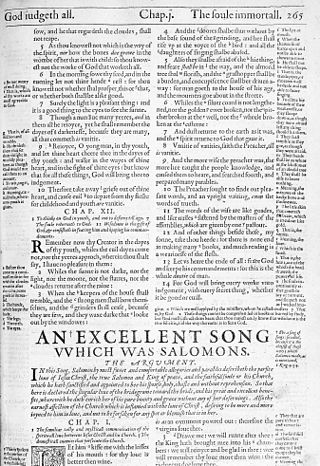
Ecclesiastes 12 is the twelfth chapter of the Book of Ecclesiastes in the Hebrew Bible or the Old Testament of the Christian Bible. The book contains philosophical speeches by a character called 'Qoheleth', composed probably between the 5th and 2nd centuries BCE. Peshitta, Targum, and Talmud attribute the authorship of the book to King Solomon. This chapter continues the previous one in the sustained encouragement to make decision and the need to act speedily.

Song of Songs 4 is the fourth chapter of the Song of Songs in the Hebrew Bible or the Old Testament of the Christian Bible. This book is one of the Five Megillot, a collection of short books, together with Ruth, Lamentations, Ecclesiastes and Esther, within the Ketuvim, the third and the last part of the Hebrew Bible. Jewish tradition views Solomon as the author of this book, and this attribution influences the acceptance of this book as a canonical text. This chapter contains the man's descriptive poem of the woman's body and the invitation to be together which is accepted by the woman.

Song of Songs 5 is the fifth chapter of the Song of Songs in the Hebrew Bible or the Old Testament of the Christian Bible. This book is one of the Five Megillot, a collection of short books, together with Ruth, Lamentations, Ecclesiastes and Esther, within the Ketuvim, the third and the last part of the Hebrew Bible. Jewish tradition views Solomon as the author of this book, and this attribution influences the acceptance of this book as a canonical text.
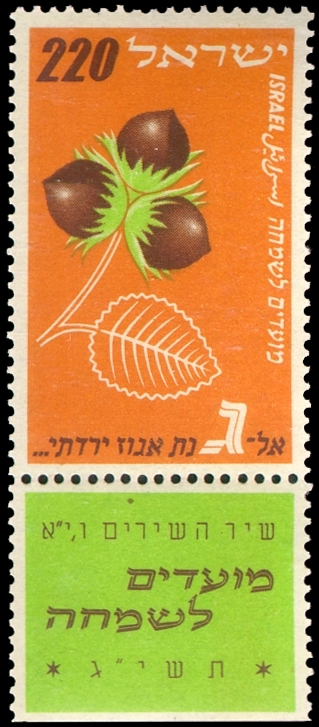
Song of Songs 6 is the sixth chapter of the Song of Songs in the Hebrew Bible or the Old Testament of the Christian Bible. This book is one of the Five Megillot, a collection of short books, together with Ruth, Lamentations, Ecclesiastes and Esther, within the Ketuvim, the third and the last part of the Hebrew Bible. Jewish tradition views Solomon as the author of this book, and this attribution influences the acceptance of this book as a canonical text. This chapter contains a dialogue between the daughters of Jerusalem and the woman about the man, followed by the man's descriptive poem of the woman, ending with a collective call to the woman to return.

Song of Songs 7 is the seventh chapter of the Song of Songs in the Hebrew Bible or the Old Testament of the Christian Bible. This book is one of the Five Megillot, a collection of short books, together with Ruth, Lamentations, Ecclesiastes and Esther, within the Ketuvim, the third and the last part of the Hebrew Bible. Jewish tradition views Solomon as the author of this book, and this attribution influences the acceptance of this book as a canonical text.

Proverbs 30 is the 30th chapter of the Book of Proverbs in the Hebrew Bible or the Old Testament of the Christian Bible. The book is a compilation of several wisdom literature collections: the heading in Proverbs 1:1 may be intended to regard Solomon as the traditional author of the whole book, but the dates of the individual collections are difficult to determine, and the book probably obtained its final shape in the post-exilic period. This chapter first records "the sayings of Agur", followed by a collection of epigrams and aphorisms.

Proverbs 16 is the sixteenth chapter of the Book of Proverbs in the Hebrew Bible or the Old Testament of the Christian Bible. The book is a compilation of several wisdom literature collections, with the heading in 1:1 may be intended to regard Solomon as the traditional author of the whole book, but the dates of the individual collections are difficult to determine, and the book probably obtained its final shape in the post-exilic period. This chapter is a part of the second collection of the book.
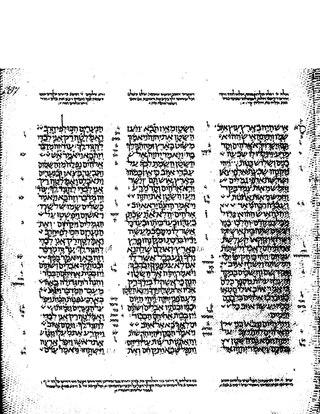
Job 3 is the third chapter of the Book of Job in the Hebrew Bible or the Old Testament of the Christian Bible. The book is anonymous; most scholars believe it was written around the 6th century BCE. This chapter belongs to the Dialogue section of the book, comprising Job 3:1–31:40.

Job 6 is the sixth chapter of the Book of Job in the Hebrew Bible or the Old Testament of the Christian Bible. The book is anonymous; most scholars believe it was written around 6th century BCE. This chapter records the speech of Job, which belongs to the Dialogue section of the book, comprising Job 3:1–31:40.

Job 12 is the twelfth chapter of the Book of Job in the Hebrew Bible or the Old Testament of the Christian Bible. The book is anonymous; most scholars believe it was written around 6th century BCE. This chapter records the speech of Job, which belongs to the Dialogue section of the book, comprising Job 3:1–31:40.
